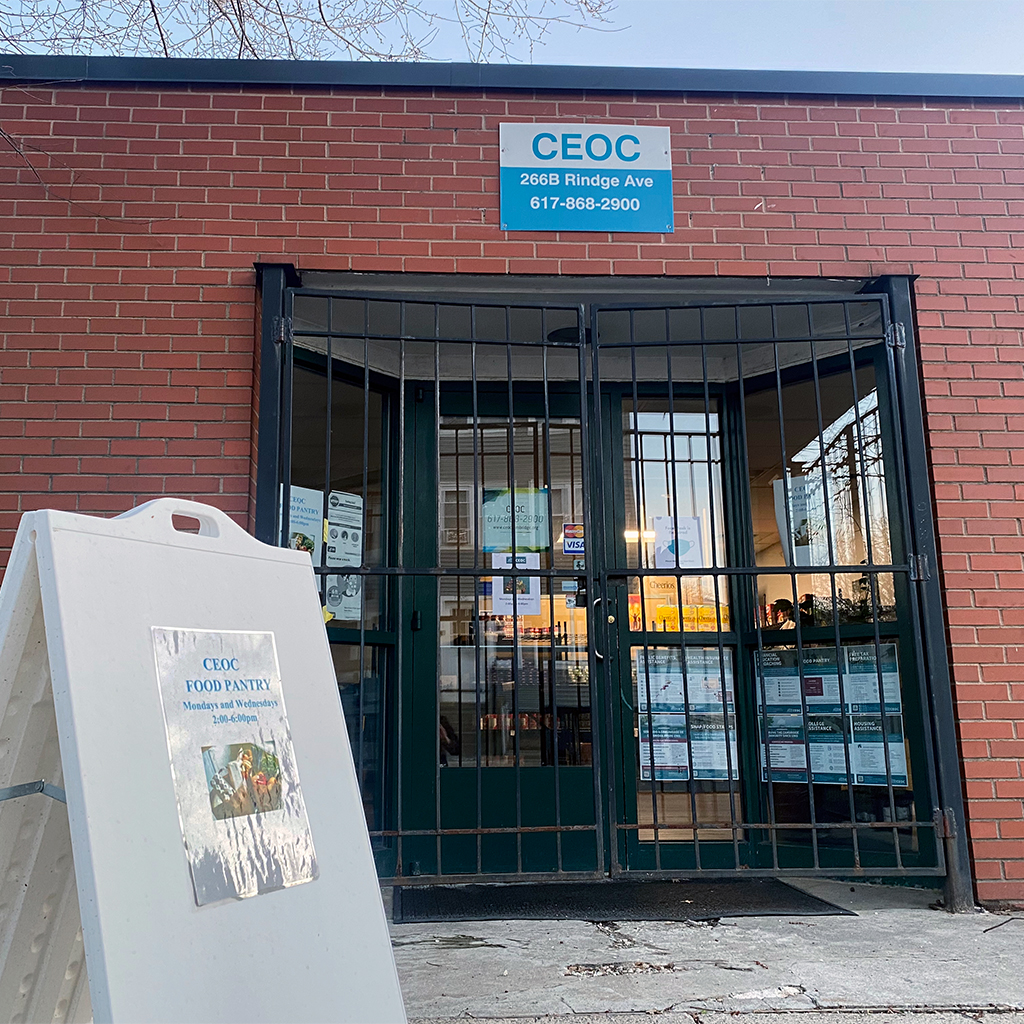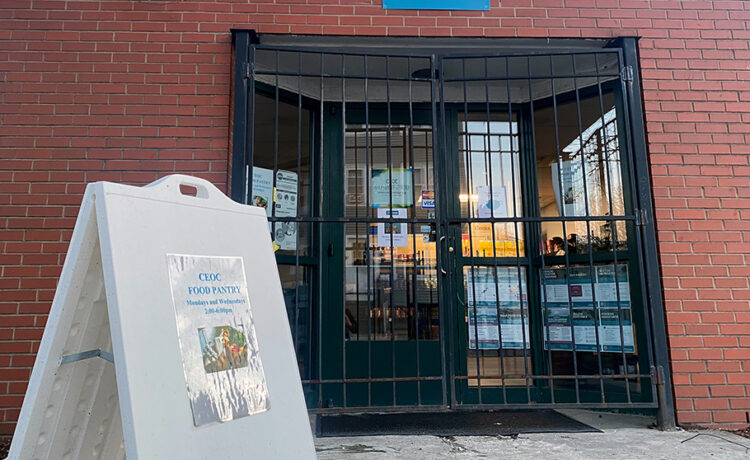
Marc Levy A food pantry run by the Cambridge Economic Opportunity Commission on Rindge Avenue is closed during a visit March 5, 2023.
The blizzard of executive orders and other actions by the administration of president Donald Trump has alarmed and angered Cambridge public agencies, nonprofit organizations and people caring for immigrants here. Though there haven’t been reports of immigration arrests and no organization has lost federal funds, to anyone’s knowledge, the Trump policy changes have led to fear and uncertainty.
“There’s really a sense of just fear,” said Tina Alu, executive director of Cambridge Economic Opportunity Commission, Cambridge’s antipoverty group. “It’s not specific to one executive order, just cumulative.”
The nonprofit runs a food pantry in Central Square and provides other services used by immigrants. Even those living in the United States legally have told staff they are afraid, Alu said. “My fear is that people are hiding out at their home,” she said, though attendance at the food pantry hasn’t dropped.
Even before Trump took office, nonprofits operating in Cambridge overwhelmingly expected his priorities to “negatively impact their work,” according to an annual survey by the Cambridge Nonprofit Coalition that was administered right after the election, coalition executive director Elena Sokolow-Kaufman said.
The 90 percent that expected those results “most frequently mentioned concerns for clients/consumers who are part of immigrant communities, specifically those who are undocumented or have mixed-status families, as well as those who identify as LGBTQ, in addition to naming a concern about increased criminalization of unhoused people,” Sokolow-Kaufman said.
The nonprofits expected that budget cuts by Trump would affect affordable housing, climate, inclusion and diversity programs at work and elsewhere, women’s reproductive health, food benefits and Social Security, she said.
Sokolow-Kaufman said she didn’t know whether any organizations were cut off when the administration ordered a “pause” in almost all federal funding and grants Jan. 28 – quickly blocked by two courts and later rescinded. The reversal won’t necessarily bring relief, she said, because “most nonprofits are very concerned about future funding from the federal government and equally concerned about the ability to make up any budget gap through philanthropy given the many nonprofits who are in a similar situation.”
Meanwhile, demand for help as seen in the survey “has not stopped growing since the pandemic,” she said. “Over the last year 68 percent of respondents reported an increase in demand for their services and 72 percent anticipate that it will only continue to increase.”
Housing Authority
Managers at the Cambridge Housing Authority expected the worst when the administration announced the federal funding pause: suddenly no money to pay landlords housing low-income tenants with Section 8 rent vouchers and the authority itself, which has switched most of its public housing tenants to vouchers tied to their unit.
It looked like that would happen. That morning, the authority “obtained a copy of the memo from [the Trump administration] and a copy of the list of programs affected which did in fact list the voucher program as well as the public housing program amongst some 3,000 programs that I counted, all subject to the memo,” executive director Michael Johnston said. “None of the industry groups knew this was coming and no one knew if February voucher assistance funds would be released by HUD.”
Adding to the worry, the government portal for accessing the money “was mysteriously shut down with a message that stated the hours for the 28th had been shifted to noon to 9 p.m. – and when noon came along, that message was replaced with a message that stated it would be ‘unavailable on the 28th,’” Johnston said.
Finally, at 5 p.m., the authority got messages from the Department of Housing and Urban Development saying the voucher programs were exempt from the freeze. After a federal judge blocked the Trump order, the administration rescinded it but said federal agencies could comb through records and end funding to programs at odds with administration priorities.
Johnston said he believes money for public housing as opposed to vouchers remains a target for the Trump administration. “As I told staff here, if there was ever a doubt as to why we moved from the public housing platform to the project-based voucher platform, this move by the administration and the fact that vouchers would have been exempt from the freeze, but not public housing, should alleviate those doubts,” he said.
The authority has transferred all but about 50 of its units to project-based vouchers as it harnessed millions of dollars in private financing to pay for upgrading developments. The investors and landlords are a protection, Johnston said. “There are investment partners that like the private landlords would suffer great losses by a freeze on [voucher] funding. I’d rather have CHA in the same bucket as private landlords and very glad we have less than 50 public housing units left,” he said.
The funding emergency, though ended for now, alarmed some staff members. “Employees here at the CHA are concerned and one reached out on the 28th to say he was terrified,” Johnston said. He said it was “disrespectful and just completely unnecessary” for the administration to send a letter to federal workers soliciting their resignation and saying that “the way to a greater American prosperity is encouraging people to move from their lower-productivity jobs in the public sector to higher-productivity jobs in the private sector.” (A judge has temporarily blocked the resignation initiative).
Public Health Department
The Cambridge Public Health Department hasn’t seen any indication that the two federal grants it gets – for its Covid-19 case tracing team and for a project intended to prevent teen drug misuse – will end, spokesperson Dawn Baxter said. One grant comes through the Metropolitan Area Planning Council and the other through the state Department of Public Health, she said.
Still, the department lost access to federal health databases when the new administration ordered agencies such as the Centers for Disease Control and Prevention to stop allowing the public to see reports and data.
“At this time, all Massachusetts disease surveillance systems are operational, and we are utilizing the work of the Harvard School of Public Health and other archival projects to access data that has been removed from the CDC and NIH websites,” Baxter said. “Although the loss of national benchmarking will impact our ability to track national trends and compare our local data, we have strong local systems that we will continue to rely on.”
Inclusivity on gender
As for the Trump administration’s hostility to diversity, equity and inclusion programs and demand that government and private organizations use the word “sex” rather than “gender” to eliminate references to any gender except male and female, Baxter said the health department doesn’t intend “to remove language such as ‘gender’ from any of our surveys and is committed to continue working toward health equity for all Cambridge residents.”
“We have no plans to alter our operations or priorities,” she said.
Similarly, after Trump issued an order forbidding transgender athletes from participating in women’s sports, Cambridge schools reiterated a pledge from interim superintendent David Murphy that “our district policies, like our community’s values, will not change. In the Cambridge Public Schools, members of the LGBTQ+ community will be valued, respected and protected. No federal policy or threat of coercion will compromise the care and dignity we demand be extended to every student, staff member and caregiver constituting the diverse constellation of individuals that are the Cambridge Public Schools”
Cambridge Health Alliance
City government and schools in both Cambridge and Somerville have continued to make those same promises yet given few details about how they will deal with the challenges they face. On the health care front, the Cambridge Health Alliance gets hundreds of millions of dollars from Medicare and Medicaid; spokesperson David Cecere has said the Alliance hasn’t noticed any unusual delays in payment. A webpage for immigrants says: “Everyone is welcome at CHA – regardless of age, language or immigration status. Our goal is simply to provide high-quality care and help people live their healthiest lives.”
Asked whether the health care system has adopted recommendations from the state attorney general for protecting immigrants if federal agents show up at a hospital or clinic, Cecere didn’t offer specifics, saying: “CHA remains committed to protecting the safety and privacy of its patients and staff. As we assess and implement policies and procedures in light of federal policy developments, CHA has been monitoring and reviewing guidance issued by state officials and other resources to ensure that we are protecting all of our patients and staff, and their information, to the best of our ability.”
Federal funds support Cambridge city government’s community development block grant program and other community programs that pay for affordable housing, help for businesses, services for homeless people and support for people with HIV, at about $6 million this year out of a total $956 million in budgeted revenues – less than 1 percent.
Small part of school budget
Cambridge’s school department expects to get $7.5 million from the federal government for educational programs, support for homeless students and school meals, according to the proposed budget for fiscal year 2026, according to a presentation to the School Committee on Tuesday. That’s just 2.7 percent of the budget, and $5 million of the total is for programs approved by law.
Schools spokesperson Jackie Piques said: “We have not received any communication that would indicate a loss of federal funding to CPS.” At the committee meeting, Murphy and the district’s chief financial officer said “that while we do not currently anticipate changes, CPS students would remain unaffected should there be any changes. Should the need arise, we would adjust our budget appropriately to ensure that meals remain available at no cost and that students receiving services through federal grant programs will not lose access to resources.”
New sources for the money would “be determined through a number of factors and careful consideration, and would be too early to speculate at this time,” Piques said.
Similarly, Jeremy Warnick, Cambridge city spokesperson, has said the city would be able to make up for any loss of federal funds and did not provide details.
Regional worries
Adam Chapdelaine, executive director of the Massachusetts Municipal Association, said in an interview that “most communities in some shape or form have some dependency on federal funds for critical needs.”
Common uses of federal funds are for block grants for community development or community services, firefighter salaries and mental health needs. Cities and towns are also worried about federal funds for transportation, he said.
Cutting off funds “would have an immediate impact,” he said.
Though Cambridge’s approved budget for the fiscal 2025 year ending June 30 lists only the community development block grant under federal revenues, the city gets additional grants during the fiscal year, though they are not budgeted.
For example, the city intends to apply for a grant from the Homeland Security Department’s Urban Areas Security Initiative, which helps urban communities pay for projects that help prepare for and protect against a terrorist attack. The grant would finance all or part of money needed to buy surveillance technology equipment: a cellular telephone hacker for $62,188 a year and 15 to 20 license plate readers at $3,000 per instrument a year.
Ironically, the Jan. 28 pause in federal funds affected the antiterrorism program, said Democratic Rep. Rosa DeLauro of Connecticut. In addition, the Trump administration has threatened to withhold any federal funding from sanctuary cities; Cambridge is one.
A spokesperson for the state Executive Office of Public Safety and Security, which administers Homeland Security grants to the state, said any of the antiterrorism grants previously approved “are active.” The spokesperson did not answer when asked when communities could apply for new grants and whether the deadline for applying for the current federal fiscal year has ended.
















